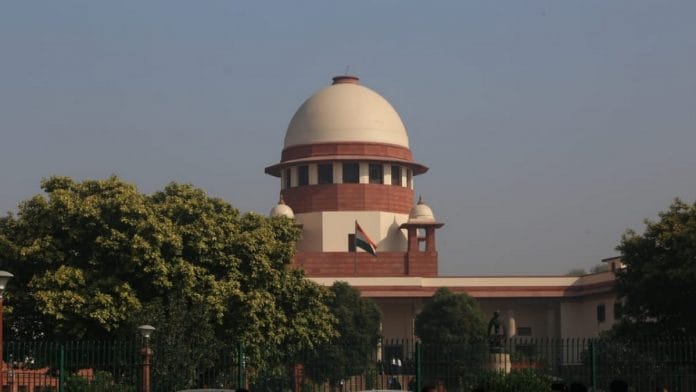New Delhi: The Supreme Court Monday refused to put on hold the government’s 4 April notification suspending certain rules under the Pre-Conception and Pre-Natal Diagnostic Techniques (PCPNDT) Act, 1994 till 30 June, in view of the ongoing pandemic.
The PCPNDT Act is aimed at prohibiting sex determination and preventing female foeticide.
During the hearing Monday, the top court noted that the country was going through a national crisis and doctors’ services should be conserved to fight the pandemic.
A bench led by Justice U.U. Lalit was hearing a PIL, via video-conferencing, filed by activist Sabu Mathew George, who has questioned the government’s “arbitrary” move to suspend some PCPNDT rules on the ground that it lacks jurisdiction.
The government’s notification suspends rules 8, 9(8), and 18A(6) of the PCPNDT Act. All these rules are to do with certain administrative procedures, “in view of the emergency situation arisen due to pandemic Covid-19, whereby entire country has been put on lockdown”, the notification states.
In the PIL, George alleged that the government has “selectively weakened a legislation”.
According to the petitioner, the three rules under suspension relate to registration of laboratories and clinics conducting sonography, maintenance of records regarding pre-conception and pregnancy, and code of conduct to be observed by the appellate authority.
“It would not be possible to interfere at this stage,” the bench told George’s lawyer, senior advocate Sanjay Parekh.
But the court agreed to issue a notice to the central government on the petition and listed the matter for hearing in the third week of July.
It also gave George liberty to approach the court on an earlier date in case the notification gets extended further.
Also read: Why India’s law on abortion does not use the word ‘abortion’
‘Govt move suspends operation of law’
Advocate Parekh contended that the notification could be misused by “unscrupulous sections to conduct sex-determination tests freely”.
Speaking to ThePrint, he said, “There is no basis for this notification, which virtually suspends operation of the entire law.”
Parekh also disagreed with the Union health ministry’s clarification, released subsequent to the notification, that prohibition on sex selection before or after conception will stay despite the notification.
He told the court that rule 8 deals with re-registration of genetic and ultrasound clinics whose licenses are due to expire. But the notification, he said, allows unregistered laboratories to operate till 30 June.
Rule 18 (6) requires appropriate authorities, as identified under the law, to submit a quarterly report to the government as well as maintain records of all practitioners.
The third rule to be put in abeyance is 9(8) that mandates all genetic and ultrasound clinics to submit a detailed report of pre-conception and pregnancy-related procedures carried out on the fifth of every month.
“Since these rules are not in operation, clinics are not required to maintain or transmit records and nor are the authorities needed to take action for any violation,” Parekh added.
‘Government lacks jurisdiction to suspend rules’
The petitioner also maintained that the three rules cannot be viewed in isolation. They are intrinsically linked to the provisions under the PCPNDT Act that deal with registration of genetic counselling centres, genetic laboratories as well as genetic clinics, and penalty for contravention of the rules.
“Despite the requirement for maintenance of records being a standard feature of laws regulating medical practices, in the present instance, the PCPNDT rules have been arbitrarily selected and ‘suspended’ under the guise of the lockdown,” George stated in his petition.
This action, he claimed, rolls back the gains made by proper implementation of the PCPNDT Act.
The PIL also states that the government action is “arbitrary”, “unreasonable”, aside from being wholly without jurisdiction. Such a power to suspend is not there in the Act, says the petition.
Also read: Minor rape victim’s right to abort outweighs foetus’ right to be born: Rajasthan High Court







It is high time to rename Supreme Court of India to Legal Cell of RSS. They have shamefully surrendered all the powers at the feet of Modi-Shah bureacracy. There salary should be paid from the illegal electoral bonds of BJP. We should not waste the tax payers money on these servile servants of BJP.